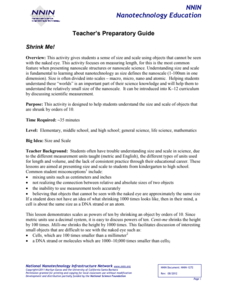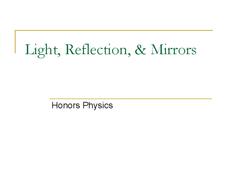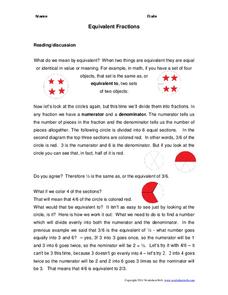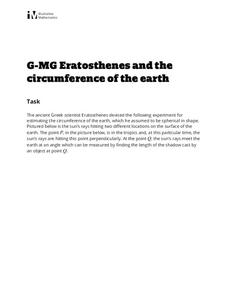Cornell University
Classification
Explore the scientific method of classification. An interactive activity asks learners to create a classification system for a group of objects and develop a flow chart to communicate their systems. In addition, individuals use a...
National Nanotechnology Infrastructure Network
Shrink Me!
The incredibly shrinking meter—decimeters to centimeters, to millimeters, and now to nanometers! Learners may have a difficult time visualizing particles on a nanoscale. Help them see a little clearer using a well-designed lesson that...
Teach Engineering
Floaters and Sinkers
Whatever floats your boat. Young engineers learn about density by measuring the masses and volumes of boxes filled with different materials. Using their knowledge of densities, they hypothesize whether objects with given densities will...
Education.com
Measure School Supplies
Ever wonder how long a pair of scissors are? Find out with this simple measuring activity in which pupils use the provided ruler to determine the length of four common classroom supplies.
College Board
AP® Computer Science A: Elevens Lab Student Guide
Looking for a project to use in an AP® Computer Science class? Engage learners with a simple solitaire game called Elevens. Through these activities, learners break down the task and write the code for a game. Sign in to your College...
American Museum of Natural History
Solar System Scavenger Hunt
Scholars go on a hunt to locate objects that best fit the measurements to create an eye-catching scale model of the solar system.
Shmoop
Functions Worksheet 5
To the point and deeper thinking are both types of questions included in the worksheet. Begin the practice of solving quadratics and then finish with five questions asking quadratic and exponential application problems.
Institute of Electrical and Electronics Engineers
Insulators and Conductors
In a classic activity, emerging electricians test various objects for electrical conductivity in a circuit. Each group constructs a simple circuit by following a diagram. Predictions are made and objects are inserted into the circuit,...
K12 Reader
Major Art Periods
After examining a brief article about the major art periods, readers use the provided graphic organizer to identify the main idea and supporting ideas in the paragraph.
Smarter Balanced
Monuments (and Landmarks)
Distinguishing between and understanding the purpose of landmarks and monuments is the focus a short activity designed to provide all learners with the context of a performance task. Images of the Martin Luther King Jr. Memorial, the...
Bowels Physics
Light, Reflection, and Mirrors
Explore the connection of light, reflection, and mirrors. A comprehensive lesson introduces the basics of light in relation to reflection and mirrors. After an explanation of the vocabulary, the presentation shows how to create ray...
National Nanotechnology Infrastructure Network
The Micro and Macro World Around Us
Don't let your eyes play tricks on you ... use scale to keep your eyes in check! Young scholars observe images without scale and try to identify the structure. Then, they look at the same image with a scale bar and assess whether their...
Curated OER
Sun and Shadows
Why do shadows look different in the summer than in the winter? What causes day and night? How can a sundial be used to tell time? Answer these questions and more through two engaging lessons about light and shadows. Fourth and fifth...
SF Environment
Pre-School Composting and Recycling!
You can never be too young to get involved in composting or recycling. Here is a lesson that has been made for the very littlest learners and it's all about the importance of conservation. They'll sort compostable and recyclable objects,...
Achieve
False Positives
The test may say you have cancer, but sometimes the test is wrong. The provided task asks learners to analyze cancer statistics for a fictitious town. Given the rate of false positives, they interpret the meaning of this value in the...
EngageNY
Computing Actual Lengths from a Scale Drawing
The original drawing is eight units — how big is the scale drawing? Classmates determine the scale percent between a scale drawing and an object to calculate the length of a portion of the object. They use the percent equation to find...
National Nanotechnology Infrastructure Network
Understanding Wave Motion - Slinky vs. Snaky: Which Spring is Dominant?
Ride the wave to an understanding of refraction! The first in a series of two inquiry-based lessons challenges learners to create transverse waves with two different types of springs. As their wave hits an object, they observe the change...
K12 Reader
Metaphors Compare Things
This worksheet on metaphors is your ticket to better writing! As learners read ten sentences, they underline the metaphor and circle the two objects of comparison.
Worksheet Web
Equivalent Fractions
Learn how to identify equivalent fractions by using divisors. After reading and discussing the skill, young mathematicians solve two problems using visual fraction models, and then solve eight equivalent fraction problems that involve...
Illustrative Mathematics
Eratosthenes and the Circumference of the Earth
The class gets to practice being a mathematician in ancient Greece, performing geometric application problems in the way of Eratosthenes. After following the steps of the great mathematicians, they then compare the (surprisingly...
Gatton Park
Magical Maths
A variety of activities take scholars outside the classroom to explore shapes, symmetry, measurement, patterns, sorting, and time in nature. Learners participate individually, and in teams, to measure found objects, go on a scavenger...
Baylor College
They're Everywhere: Bacteria
Totally gross out your class with the eighth lesson in this series on food science. Explore the microscopic world of bacteria by taking swabs of different classroom objects and growing colonies in petri dishes. An engaging activity that...
Dick Blick Art Materials
“Gawu” — African-influenced Tapestry
Here's a great way to combine environmental science with art. Kids use recycled materials to create their own Gawu, a tapestry made of discards. Although designed for special education classrooms, the activity is sure to engage all...
Dick Blick Art Materials
Painted Lockets
Painted, portable, pocket lockets encourage kids to display personal treasures and items they value. The activity, combining art with social and character studies, is perfect for any classroom.

























